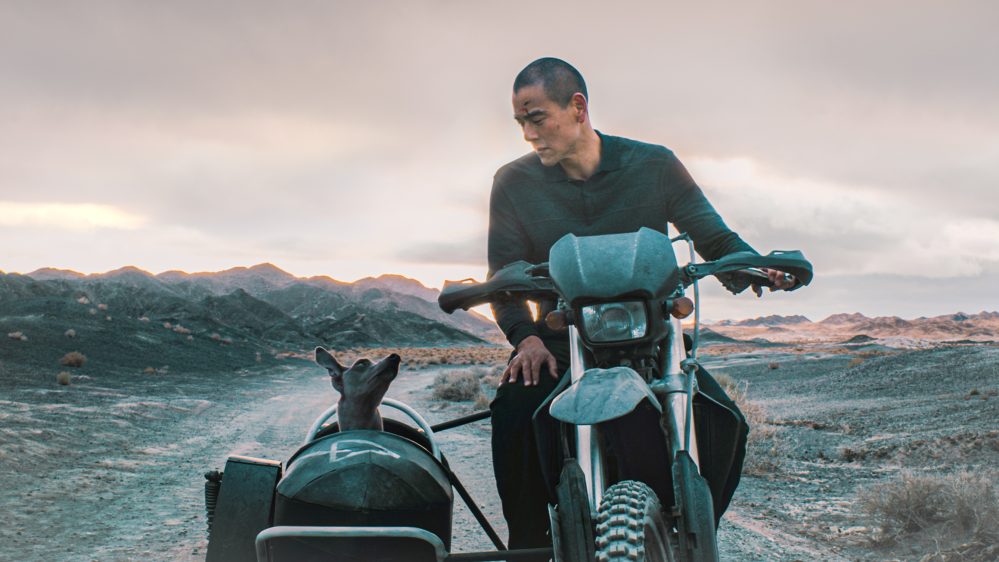A troubled loner returns to his hometown and bonds with a potentially rabid canine in Chinese director Guan Hu's magnificently shot, moody and moving fable.
By Jessica Kiang
You might not get the dog you want, but you always get the dog you need. That old dog-lover’s adage applies peculiarly well to Chinese director Guan Hu‘s “Black Dog.” A far smaller-scale project than his recent blockbusters “The Eight Hundred” and “The Sacrifice,” Guan’s latest — an Un Certain Regard standout at Cannes this year — nonetheless has the grandly cinematic vision to lend an intimate tale a gloriously epic, allegorical edge.
Set in a dying town on the fringes of the Gobi desert, “Black Dog” has elements of the genre western, like taciturn loner antihero Lang (a fantastic Eddie Peng), who returns to his eroded hometown himself hollowed out by repressed guilt for the incident that caused his recent imprisonment. But, dipped in the caustic soda of social commentary and steeped in the fatalistic mood of a place barely chugging by on borrowed time, the film also cleaves to the tradition of film noir, in which desperate, often criminal protagonists struggle to escape their seemingly foreordained fates. But in a variation that offsets the darkness of, say, Diao Yinan’s “The Wild Goose Lake” or Wei Shujun’s “Only the River Flows,” the femme fatale here is more a chien fatal. Lang has a human love interest — Grape (Tong Liya), a free-spirited performer with a touring circus troupe — but his mild dalliance with her runs nowhere near as deep as the kindred-spirit bond between him and the titular hound.
A striking opening setpiece acquaints us immediately with the bleach-bone splendor of DP Gao Weizhe’s widescreen shotmaking, in which skies are the color of acid-washed denim and the far-off mountains and nearby escarpments look as forbidding as the surface of some uninhabited planet. A dinky minibus is trundling through the scraggly, arid landscape when, in an impressive testament to the film’s animal-wrangling team, a pack of stray, semi-feral dogs swoops down from a nearby hillside like a guerilla army launching a sneak attack. The startled bus driver swerves and his rickety vehicle overturns. The occupants, including Lang, crawl from the wreckage, unharmed and drolly unfazed except for one sclerotic passenger who claims immediately that someone has stolen all his money. He insists on their waiting for the police, and so Lang’s homecoming is noisier and more official than he’d have liked.
Popular on Variety
Before his incarceration, Lang was a celebrity in this dead-end town: the son of an erstwhile bigwig, a stunt motorcyclist and a guitarist. Now he’s holed up in his family home, which abuts the dismal local zoo, where his father is strung out and intent on drinking himself to death. These days, Lang wants nothing more than to live quietly and avoid the attentions of petty gangster and snake-venom vendor “Butcher” Hu, who is out for revenge for Lang’s part in his nephew’s death. But he is going to need some money, so when he realizes that there is a bounty on the vicious black dog he spotted earlier, he fashions a net and goes on a hunt. He comes back bitten and bruised: Black Dog (a wiry whippet mix called Xin) proves a much wilier adversary than Lang had imagined.
But dogs are a problem in this town, and in the run-up to the 2008 Beijing Olympics, budget has been found for a task force to round up all the unregistered canines. Lang lands a place on the posse, due to his connection to team leader Uncle Yao, amusingly played by director Jia Zhangke (whose wondrous “Caught by the Tides” plays in Competition at Cannes this year). And the next time he encounters his canine quarry, they strike up a rapport over the course of a freezing night stranded in the desert, and a self-imposed seven-day quarantine while Lang waits to see if he’ll develop rabies.
The film has maybe one too many contrived incidents, like a solar eclipse or a zoo liberation or Butcher Hu’s elaborate vengeance plans, that feel cooked up mainly for the opportunity for a cool visual. But Gao’s visuals are so very cool — in both senses, the blue-green grade casting a chilly seaglass pall over everything — that they become self-justifying: exquisite shots of wild animals roaming the boarded-up streets, of a far-off figure dangling from a bungee off an industrial crane, or of Lang silently absorbed in soldering a makeshift sidecar to Black Dog’s specific dimensions.
Achieving a delicate balance between drama and deadpan comedy, Guan’s approach gives the scenes of violence or tragedy a certain antic, Buster Keaton quality, which is enhanced by both Peng’s impassive yet physically expressive performance, and that of his wonderful canine co-star. Each is not what the other wants, but very much what they need, which is a reason to drop the hostility they both use as armor-cladding for noble natures too often misunderstood by the ignoble world. Inside every bad boy is a Very Good Boy trying to get out.
A Variety and iHeartRadio Podcast
The Business of Entertainment

